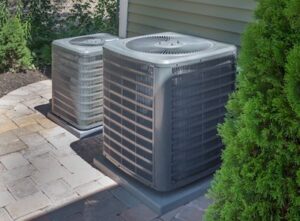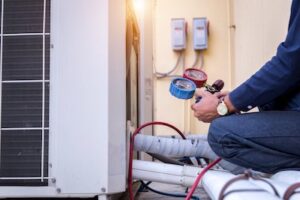Preparing Your Heating System For the Winter
The cold weather is coming, and that means it’s time to start preparing your home heating system for the winter. Many people forget to do so or they do not think that it is that necessary. However, there are many important reasons why you need to do so. Here are the key reasons why you need to prepare your heating system for the winter:
- Avoid Major Breakdowns and Prevent High Repair or Replacement Costs
- Improve Efficiency
- Enhance the System’s Longevity
- Improve Air Quality
If you don’t take the necessary precautions, you could end up with a broken heater and a lot of expensive repair bills. The best way to keep your heating system in great condition is to follow a regular maintenance schedule. The machine needs regular maintenance from time to time, and you must know how to do it properly. To prepare the heater for the winter, repair (or replace) faulty parts and conduct some little tweaking to improve its efficiency during the cold days. If done correctly, your machine will run smoothly for years to come. So now that you have an idea of why you should prepare your heating system for the winter, let’s examine each of the reasons in greater detail, as well as how to prepare your system. So, keep reading for all of this and more!

Avoid Major Breakdowns
Minor problems can lead to major ones. So, if your heating system isn’t in good condition, it’s likely to break down when you least expect it – even during winter when you need it most. This is when you will be in need of boiler repairs.
The cost of these unexpected expenses can be high—and it’s often financially devastating for homeowners who are already struggling with high utility bills. Besides avoiding costly repairs, the regular checks you make on our heating system ensure it’s working at its optimum level, reducing energy costs by up to 15%. You should also ensure the unit is installed properly to avoid problems later. But that shouldn’t worry you because service providers can help with the heating installation.
Improve Efficiency
The longer you use an appliance, the more wear and tear it will suffer. This can cause reduced performance (sluggish performance equals high power consumption), higher emissions, and increased maintenance costs. Maintaining your heating system regularly will reduce these factors by keeping it running at peak efficiency in winter and beyond.
What’s more? When you have a properly maintained heating system, you can expect less downtime because there are fewer or no failures in the coming days. Improved efficiency translates to improved reliability!
Enhance Longevity
Maintaining the good condition of your heating system can keep it running efficiently for many years. If you tune it up today, it will last you through the winter months and beyond; and you won’t need to call on a repairman soon. So, if you have an old one, it may be worth investing in some extra parts or servicing instead of buying a new heating system.
Improve Air Quality
Indoor air quality is important for your health. Exposure to polluted air can lead to asthma, allergies, and respiratory illnesses. Unfortunately, air quality is poor during winter because dense air traps more pollutants and moves slowly. But winter or not, regular maintenance will help reduce the chance of mold and mildew growth in your heating system, as well as dust and dirt buildup.
Also, maintaining your heating system regularly means that you’ll enjoy peace of mind henceforth. Healthy and clean indoor air will make your home more comfortable for everyone who lives there. It also means that you won’t have to spend more money on utility bills and unnecessary repairs in the days ahead.

Is Your Heating System Ready For Winter?
Despite the several benefits of preparing heating systems ahead of winter, many people easily forget about their system and assume everything is fine. In reality, though, there could be a problem even worse than you think. So we’ve put together this handy guide on how to prepare your heating system for the coldest months of the year.
1. Change the Air Filter
How often do you change the air filter? If the back of the heating unit is too hot and the energy bill is unusually high, you need to clean or replace the air filter. Other signs of a bad filter include low airflow and rising cases of health issues like headaches and allergies.
Should you decide to replace the filter, there are many options to choose from, including HEPA and carbon filters – the main difference between these two is their effectiveness at removing particulates from the air. Carbon filters are better at removing dust particles, while HEPA filters perform better at removing allergens and other heavy pollutants. If you’re looking for something that’s easy to clean and lasts longer than other options, HEPA filters might be your ideal option.
2. Clean the Vents and Registers
Check the air vents and registers for any obstructions or leaves. If there are any, remove them and clear out their contents so that when it comes time to use your heating unit again in the winter, everything will work perfectly. Remember to use a vacuum cleaner with soft bristles (or even a small brush) so that nothing gets damaged during this process.
3. Clean the Thermostat
The thermostat controls the temperatures in and around the heating system, and dirt affects how this essential element works. If you notice an abnormality, such as the heating system using more energy during warm weather, you’ll need to clean the thermostat in the following steps:
- Open the Cover of Your Heating Unit By Removing Screws From Around Its Perimeter. If there are no screws visible on the outside of your unit, then look inside at where it meets up with other parts inside such as pipes or hoses.
- Clean the Thermostat with Compressed Air or a Soft Brush.
- Replace Bad Batteries with New Ones.
- Have a Professional HVAC Technician Replace Corroded Wires.
- Reinstall the Thermostat.
4. Add Insulation
Insulation is a great way to keep your heating system running smoothly. You can add it to walls and ceilings, pipes, ducts, windows, and vents to prevent heat from escaping from the space being heated. The more insulation you have in your house, the less work your heating system will need to do. This also means less wear on parts and reduced energy bills during winter.
5. Seal Any Leaks In the Ducts
Duct leaks can cause the heating system to channel quality air to unwanted areas such as the attic and basement. You don’t want to end up with high utility bills emanating from increased energy consumption. If you have any leaks in your ducts, now is the time to seal them up. Use duct tape, metal tape, or foil to cover up any gaps around your furnace, air conditioner, and vents. You may as well insulate the ducts using HVAC-specific tapes.
6. Check the Exhaust Flue
Did you know buildup in the exhaust flue can cause carbon monoxide poisoning and fires? That’s why you need to check for and remove obstructions such as leaves, twigs, and so forth. Also, check for leaks in the flue and remove any rust or clingy coating on it.
7. Inspect the Outdoor Unit
If you have an outdoor unit, inspect it for damage and leaks. Make sure it is clean and free of debris. Also, make sure that the surface of your heater is level and stable – the last thing you want is a winter mechanical failure as a result of poor installation or maintenance.
Depending on where you live, snow might block parts of your heating system from working properly during the winter months. You should also check if any plants are growing near or under your heating system; these could block airflow through vents or pipes, causing overheating.
8. Schedule a Maintenance Checkup
A professional HVAC contractor can inspect, clean, and service your system if they are any necessary repairs to be made, thus ensuring that it’s ready to keep you warm all winter long. A professional inspection can identify potential issues and help you avoid costly repairs down the road. In addition, a professional HVAC contractor can also ensure that your system is operating as efficiently as possible. This can save you money on your energy bills and make your home more comfortable overall. So if there seems to be a problem with your heating system and you are not sure what to do, don’t wait until it’s too late to get it checked out. Contact a professional HVAC contractor today to schedule an inspection and make sure your system is ready for the cold weather ahead.

Conclusion
Taking care of your heating system is not only important to keep you warm and safe in the winter, but it’s also a great way to save money. By monitoring your system, you can make sure that everything works correctly and that there are no potential problems that could become big issues. Remember there are a number of potential problems that can arise with heating systems, and it’s best to catch them early before they cause major damage or lead to a complete system breakdown. Also, remember these tips above and if you can’t fix something yourself, seek professional help from an HVAC technician.
